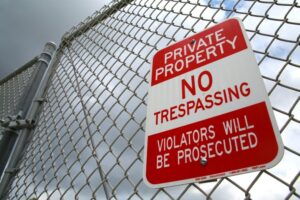Property owners must carefully maintain their premises at all times. They may be liable for the resulting injuries and damages when they fail to do so, and an accident occurs. Although slips and falls comprise a significant portion of premises accidents, other common occurrences include negligent security incidents, trips and falls, and elevator/escalator accidents. If you suffered injuries in a recent premises accident, consult an experienced attorney immediately. A premises liability lawyer in your area can investigate the circumstances of your premises accident, speak with witnesses, and file a claim on your behalf. If the handling insurance company adjuster refuses to make a fair settlement offer, your lawyer can pursue litigation in the state court system for you.
Common Examples of Accidents on Others' Premises
Premises accidents encompass a wide range of incidents on someone else's property and can result in serious injuries and damages. Understanding the most common types of premises accidents is essential to promote safety and prevent avoidable harm. Some of the most common types of premises accidents include:- Slip and Fall Accidents – Slip and fall accidents are among the most prevalent premises accidents. They often occur due to wet or slippery surfaces, uneven flooring, inadequate lighting, or poorly maintained walkways. Property owners must maintain a safe environment and promptly address hazards to prevent slip and fall incidents.
- Trip and Fall Accidents – Similar to slip and falls, trip and fall accidents often result from uneven surfaces, loose carpets or rugs, debris, or walkway obstacles. Property owners should regularly inspect and address these issues to minimize the risk of tripping accidents.
- Elevator and Escalator Accidents – Malfunctions or defects in elevators and escalators can lead to accidents causing injuries. Regular maintenance and timely repairs are crucial to preventing accidents related to these commonly used facilities.
- Inadequate Security – Premises liability also extends to security considerations. Inadequate security measures can lead to assaults, robberies, or other criminal activities by third parties who are present on the property. Property owners must take reasonable steps to provide a safe environment, including proper lighting, security personnel, and surveillance systems.
- Dog Bites – Dog bites and animal-related incidents are premises accidents on someone else's property. Owners are generally responsible for their pet's behavior, and negligence in controlling a dangerous animal may lead to liability for injuries resulting from bites or attacks.
- Negligent Maintenance – An owner's failure to maintain the premises can result in various accidents. This includes broken handrails, malfunctioning equipment, or neglected structural problems. Property owners should address maintenance concerns promptly to prevent accidents and injuries.
- Unsafe Swimming Pool Conditions – Accidents around swimming pools often result from inadequate safety measures, such as lack of fencing, improper signage, or failure to maintain the pool area. Drowning, slips, falls, or other injuries can occur if proper precautions are not in place.
- Fires and Burns – Poorly maintained electrical systems, faulty appliances, or inadequate fire prevention measures may contribute to fires and burn injuries on someone else's premises. Property owners must adhere to safety standards and regulations to minimize fire risks.
What is the Property Owner's Legal Duty of Care?
The legal duty of care that a property owner owes to a visitor is fundamental in premises liability law. This duty varies based on the visitor's status on the property, which usually falls into one of three distinct groups: invitees, licensees, and trespassers.Invitees
Invitees are individuals who enter the property with the owner's express or implied invitation, often for the mutual benefit of both parties. Property owners owe the highest duty of care to invitees. Specifically, owners must maintain the premises reasonably safe, regularly inspect for potential hazards, and promptly address any dangers that may arise. This includes hazards the owner is aware of or should be aware of through reasonable diligence.Licensees
Licensees are guests or visitors who enter the property without the owner's permission but for their purposes rather than mutual benefit. The duty of care towards licensees is slightly lower than that owed to invitees. Property owners must warn licensees about known hazards that may not be obvious and make a reasonable effort to ensure their safety.Trespassers
 Trespassers enter the owner's property without permission, and the property owner's duty of care toward them is the lowest. However, property owners do not absolve themselves of all responsibility. They must still refrain from willful or wanton misconduct that may cause harm to trespassers. Additionally, suppose a property owner is aware of frequent trespassing, especially by children. In that case, there may be a duty to take reasonable steps to prevent harm, such as securing potentially dangerous areas.
In all cases, property owners are responsible for exercising ordinary care in maintaining their premises. This includes addressing known hazards, conducting regular inspections, and taking precautions to prevent foreseeable injuries. Suppose a property owner is negligent, which includes not addressing hazardous conditions, providing insufficient warnings, or neglecting proper maintenance. In that case, they may be held liable for injuries sustained by visitors on the premises.
Understanding and fulfilling these care duties is crucial for property owners to avoid legal consequences and create a safe environment for those who enter their premises.
Trespassers enter the owner's property without permission, and the property owner's duty of care toward them is the lowest. However, property owners do not absolve themselves of all responsibility. They must still refrain from willful or wanton misconduct that may cause harm to trespassers. Additionally, suppose a property owner is aware of frequent trespassing, especially by children. In that case, there may be a duty to take reasonable steps to prevent harm, such as securing potentially dangerous areas.
In all cases, property owners are responsible for exercising ordinary care in maintaining their premises. This includes addressing known hazards, conducting regular inspections, and taking precautions to prevent foreseeable injuries. Suppose a property owner is negligent, which includes not addressing hazardous conditions, providing insufficient warnings, or neglecting proper maintenance. In that case, they may be held liable for injuries sustained by visitors on the premises.
Understanding and fulfilling these care duties is crucial for property owners to avoid legal consequences and create a safe environment for those who enter their premises.
Common Injuries in Premises Accidents
Accidents on someone else's premises can result in injuries ranging from minor to severe. The types of injuries often depend upon the accident circumstances, the nature of the property, and the level of care that the property owner exercised under the circumstances. Some of the most common injuries in premises accidents include:- Traumatic brain injuries
- Fractures and bone injuries
- Back and spinal cord damage
- Soft tissue injuries
- Cuts and lacerations
- Burn injuries
How Do You Prove a Premises Liability Claim or Lawsuit?
Proving a premises liability claim or lawsuit requires a systematic and comprehensive approach, emphasizing evidence, legal principles, and effective advocacy. Some key steps to strengthening a premises liability case include:- Seeking Ongoing Medical Attention – Obtain prompt medical attention for the injuries you sustained on someone else's premises. Medical records and professional opinions help link your injuries to the accident and establish the extent of your damages.
- Preserving Evidence – Preserve any relevant evidence, such as clothing worn during the incident, defective equipment, or any objects contributing to the accident. This physical evidence can strengthen your case by providing tangible proof of the conditions during the incident.
- Gathering Witness Statements – Collect statements from witnesses who observed the incident. Their firsthand accounts can corroborate the events leading to your injuries and contribute to the overall credibility of your case.
- Establishing the Legal Duty of Care – Demonstrate that the property owner owes you a legal duty of care. This duty may vary based on your status on the property (i.e., as an invitee, licensee, or trespasser) but generally involves maintaining a safe environment and addressing known hazards.
- Proving Breach of Duty – Establish that the property owner breached the legal duty of care owed to you. This may involve showing negligence, such as failure to address a hazardous condition, lack of warning signs, or inadequate property maintenance.
- Proving Causation – Demonstrate a direct link between the breach of duty and your injuries. This involves establishing that the hazardous condition directly caused or significantly contributed to the incident.
- Consistent Documentation – Maintain consistent and accurate documentation throughout the process. This includes records of medical treatments, medical expenses, communication with the property owner, and any other relevant information supporting your claim.
- Engaging Expert Witnesses – Depending on the complexity of your case, consider retaining expert witnesses, such as safety experts or engineers, to provide professional opinions on the property's conditions and the property owner's negligence.
Factors that Determine Whether You Should Litigate a Premises Liability Claim
 Deciding whether to accept a settlement offer or litigate a premises accident case is a nuanced process that demands a careful examination of various factors. Some important factors may include the following:
Deciding whether to accept a settlement offer or litigate a premises accident case is a nuanced process that demands a careful examination of various factors. Some important factors may include the following:
- Strength of the Case – Evaluate the strengths and weaknesses of the premises accident case. If the evidence is compelling and establishes clear negligence on the property owner's part, it may provide a strong foundation for litigation. Conversely, a settlement offer might be more secure if the evidence is unclear or the case has weaknesses.
- Potential Damages – Consider the potential damages the injured party may be entitled to recover. If the damages are substantial, such as significant medical expenses, loss of income, or long-term disabilities, pursuing litigation may be more justifiable to secure appropriate compensation.
- Available Insurance Coverage – Assess the property owner's insurance coverage. If there is adequate insurance, negotiating a settlement may be a smoother process, as insurance policies typically exist to cover such claims. However, if the property owner is underinsured or lacks coverage, litigation might be necessary to pursue the full extent of damages.
- Costs of Litigation – Analyze the potential costs associated with litigation. Legal fees, court expenses, and time commitment can be significant factors. If the costs outweigh the potential recovery, settling might be a more practical and cost-effective choice.
- Timeline and Resolution – Consider the desired timeline for resolution. Litigation can be a lengthy process, whereas settlement offers the possibility of a quicker resolution. If time is crucial, settling may be the more appealing option.
- Risks and Uncertainties – Acknowledge the risks and uncertainties of litigation. Court outcomes can be unpredictable, and there is no guaranteed success. Accepting a reasonable settlement might be prudent if there are substantial risks or the case is finely balanced.
- Goals and Preferences – Some accident victims may prioritize a fair and timely settlement, while others may seek justice through litigation.
- Settlement Negotiation Dynamics – Assess the willingness of the opposing party to negotiate in good faith. If there is a reasonable chance of reaching a satisfactory agreement through negotiation, it may be a more efficient and less adversarial option than proceeding to trial.
What Damages are Recoverable in a Premises Accident Case?
Victims may be eligible to recover economic and non-economic damages following an accident on someone else's premises. Common types of monetary recovery include compensation for:- Lost earnings
- Loss of earning capacity
- Past medical expenses
- Anticipated medical costs
- Pain and suffering
- Inconvenience
- Loss of life enjoyment
- Loss of use of a body part (such as from paralysis)
- Loss of consortium
- Permanent disability or disfigurement
- Punitive damages
- Wrongful death
Contact a Premises Liability Lawyer in Your Area Today

